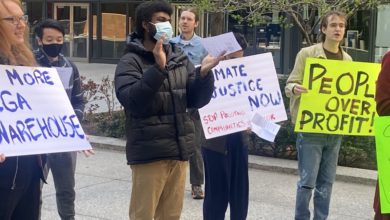On March 6, parents of students at Vaughn Occupational High School in Chicago got a call they were not expecting. An aide at the small public school for students with disabilities had tested positive for COVID-19. It was the first case within the City of Chicago. Students and their families were told to isolate at home and wait to be contacted by the Chicago Department of Public Health.
The local media quickly went into action interviewing as many parents as they could find. “I was contacted by Channel 7, and I realized it was really important that CPS [Chicago Public Schools] and the City heard me say I was concerned for all our families especially single moms who would be forced to stay at home,” said Cindy Ok, a parent and Chair of Vaughn’s Local School Council.
Vaughn serves 212 students with mild to moderate cognitive impairment aged 14 to 21. Many of the students also have complex medical needs. Seventy-five percent of the students are from low income families and 30 percent speak limited English. Students are regularly bused to the school from all parts of the city.
Two days later Ok started an online fundraiser for the families, and food pantries were asked to donate. State Representative Lindsey LaPointe allowed her office to be used as a drop off point. At Ok’s suggestion, the school’s principal asked teachers to contact families in their homerooms and find out if they needed food, cleaning supplies, money or thermometers. CDPH asked for each student’s temperature twice a day, yet many families did not have thermometers.
It was hard to reach all the parents. Some had had their phones disconnected while others would not pick up unknown numbers. Some did not speak English or Spanish, while others had intellectual disabilities themselves.
Throughout the week, food and supplies came in, as did lists of what families needed. Some families had to be dealt with immediately. “On Tuesday I got a phone call from a mother who’d never received any calls, desperate for food. She wanted juice, milk, tuna and vegetables for her daughter, so I InstaCarted an order right away” said Ok. “Another mother who’d had open heart surgery was in pain and couldn’t leave the house and she wanted Tylenol, so I InstaCarted that to her house.”
Parent Vince Henchek volunteered to go to the grocery store to pick up the things that parents needed that were not donated by food banks. Panic buying had just set in. “It was difficult as there were so many people there and so much was out of stock,” he said. “The out of stock items were the ones most frequently requested, like toilet paper, sanitizing supplies and paper towels.” He was able to get thermometers as a new shipment had just come in, and two hours later dropped off almost $300 worth of supplies at LaPointe’s office. “It was nice to know that my time spent would benefit families who were unable to make it to the grocery store,” Henchek said. Other volunteers sorted and bagged the supplies and dropped them off, along with cash from the online campaign, to waiting families.
More food donations came in from food banks and several restaurants. Ok and parent Nancy Bender bought additional supplies and made another delivery to the families. Bender was disappointed that the city was slow to respond to people’s needs. “Why do we have all these GoFundMe things?” she asked. “We don’t have a social safety net and it’s wrong. It’s great that we can step up and help people, but we just need better health care, a better safety net.”
Toward the end of the two-week quarantine period the team made another delivery. “Some more teachers made a final push,” said Ok. “We made deliveries to 13 more families, some who had never been contacted. Some had multiple family members living in the same apartment, had lost their jobs or were undocumented workers.”
Just before the quarantine ended, Illinois’ governor closed the state’s schools. Chicago Public Schools stepped up and started providing breakfast and lunch for students and the city and food pantries reached out to those in need. Ok is still distributing money from the $16,000 raised to help families get by. But for the first two weeks it was working class families coming together in solidarity and helping other families at a time of need.




